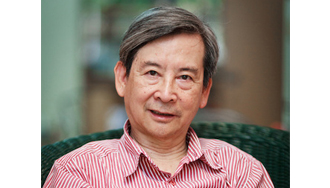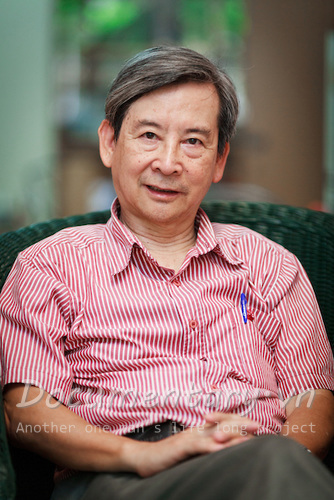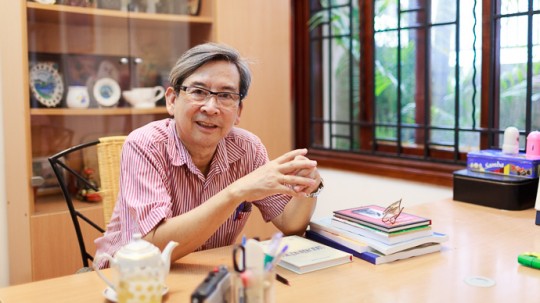
VWhite chalk, blackboard, still the same lecture hall
Still the same teacher walking leisurely this morning
A little bit of wind and silver hair
Many autumns have passed quietly under the trees…
Those are the opening lines of the poem I wrote for Professor Dinh Van Duc on November 20, 2008, on the occasion of his receiving the title of People's Teacher.
How fast. This year (2015), Professor Dinh Van Duc turned 72.

Professor, Doctor, People's Teacher Dinh Van Duc
It's not that I don't remember the year of his birth. But I (as well as many of my friends) have made many mistakes. After all these years, his appearance is still the same: gentle, calm, cheerful and very humorous. He is still diligent with his books, teaching every day, not only for graduate students and researchers but also for undergraduate classes. When I went to the University of Social Sciences and Humanities to teach, I often caught him walking to the lecture hall to keep up. "I have to go to class now. Wait for me, we'll meet after recess" - then he hurried away. I watched his appearance and tried to imagine a teacher I was lucky enough to study with nearly forty years ago.
It was early 1979. Our K22 Language class (Faculty of Literature, Hanoi University of Science) was studying the topic of Vietnamese Grammar in the part of Words. Teaching us was a young, completely new lecturer whom we had met for the first time. He was of average height, white skin, a handsome face with a pair of intellectual white glasses. He was even more handsome in his outfit which, for us “young people” at that time, was very “fashionable”, very “stylish”. On the first day, the whole class was fascinated by his teaching style: mature, clear, concise… with many difficult examples from Russian (more than half of our class was studying this foreign language). Later, we learned that it was Mr. Dinh Van Duc, who had just defended his PhD thesis the previous year in the Soviet Union.
Then in the following years, due to work and other relationships in life, I had many opportunities to meet and be close to the teacher and read works named after Dinh Van Duc. I understood more about a teacher whom I always respected.
Professor Dinh Van Duc comes from a family of ordinary intellectuals in Thanh Hoa. His family has been teaching for four generations. Like many of his peers, during the war against the French, the small, intelligent and active boy Duc had to follow his parents to evacuate to many places according to the agency, knowing many people and many situations. He surprised many people because even though he was still young, he already looked like a "young old man", very observant and thoughtful by himself. Right from primary and secondary school, he was a very good student with a talent for social and humanities subjects. At that time, schools had a very bustling movement of making wall newspapers "a hundred flowers blooming". Duc's first "improvised" essays were soon highly appreciated and enthusiastically encouraged by teachers and friends. The homeroom teacher of his final grade advised him to take the entrance exam for a faculty with a tendency towards Literature, even though he really liked History and Geography. So in 1961, Dinh Van Duc was admitted to the Faculty of Literature, Hanoi University of Science, after the exam "Nam school takes the exam with Ha school.” in Nam Dinh. At that time, people used to call the Faculty of Literature as “General Literature” (as well as General Mathematics, General History…), a name that bears the mark of a time, showing the honor of a very necessary and very valuable basic science.

He was Head of the Vietnamese Department (Hanoi University) (1985–1990); Head of the Linguistics Department, University of Social Sciences and Humanities (1996-2004).
Recalling this, Professor Dinh Van Duc told a funny story. He said: “I entered the General School but unlike many of my classmates, I was not yet a member of the Youth Union. At that time, it was very difficult to join the Youth Union. When I was in high school, I was considered a “petty bourgeois” because I was interested in reading “unofficial” literary works (of the Tu Luc Van Doan with names like Khai Hung, Nhat Linh, Hoang Dao, Thach Lam and the New Poetry movement, etc.) which were being condemned. Then there was a time when I was considered lazy when I went to help people harvest rice, I had the “initiative” to run back and borrow a bicycle to carry the rice instead of carrying it on my shoulder.” But that was just a passing story. A few months after entering university, thanks to the results of my studies and self-cultivation, this “romantic” young man quickly joined the Youth Union. And now he is nearly forty years old in the Party.
Student Dinh Van Duc's dream of improving his Russian language so that he could later have the opportunity to study Russian literature in depth was stopped halfway because of an unexpected situation that made him turn to another path: Linguistics. That was at the end of the first semester of 1962, teacher Nguyen Phan Canh (whom many people knew through his thesis onPoetic language(of him) recognized the student's ability and introduced student Dinh Van Duc to teacher Nguyen Tai Can. Teacher Can asked about his aspirations and asked if he wanted to go to Linguistics. At first, the teacher was not very interested in him because he thought the student was not determined (easily gave up). But then Dinh Van Duc was completely captivated by teacher Nguyen Tai Can's talent and personality and was completely moved to confidently enter the new field. So, Dinh Van Duc decided to "jump into" a very new field, not only because "dry, difficult, miserable"But the future at that time was very difficult to predict, and very few people were passionate about it (The teacher still quoted the Kieu verse: "Who knows where to put all his heart and soul").
Being retained as a lecturer in the Language Department of Hanoi University of Science at that time, an environment full of excellent teachers, was a great honor. Young lecturer Dinh Van Duc (as well as other teachers in the Department, in the Faculty) had to endure many hardships during the war (when the US expanded bombing to the North). After receiving the appointment letter for cadres for exactly 4 days, he and his colleagues went to the remote area of Dai Tu district, Bac Thai to build a wartime facility for the University of Science in the middle of the wild mountains and forests, full of deprivation. Living in the scene of "thatched houses, bamboo walls, eating in the mountains, sleeping in the forest" for four years, the teachers overcame everything, teaching, self-studying, and implementing a field investigation program on ethnic languages, focusing on Tay - Nung languages and the results were very successful... Teacher Duc also matured from there thanks to his willingness to study and his diligence in "serving a hundred families".
So, thanks to the unexpected "change of direction" event as mentioned, our Linguistics community has a new expert, specializing in Vietnamese Grammar. After years of studying in Rostov and Moscow (Soviet Union), he was formally trained in the direction of Linguistic Theory, he returned to continue to delve into Vietnamese Linguistics. The bookVietnamese Grammar - Word TypesDinh Van Duc's work, published in 1986, marked the Vietnamese language community with a new perspective and a new approach to Vietnamese word classes based on functional theory. After thirty years, this monograph is still very topical and profound, increasingly affirming the scientific value of the work. This year, he has just published volumes I & II, further exploiting and updating these contents.
But Professor Dinh Van Duc's scientific contributions do not stop there.
As a professional researcher, he is very willing to learn everywhere, every time (He said: We need to learn even from our students). Always sensitive to new things, reading foreign languages well (Russian, English, French), he also had the opportunity to lecture at universities in many countries (France, Korea, America, Canada, ...), so he has absorbed and accumulated many ideas and academic methods of Modern Linguistics. He read a lot, practiced many observations and realized that: "For a while, after escaping the framework of describing Vietnamese grammar from a European perspective, Vietnamese linguists believed that there must be a different way of treating Vietnamese" (Lectures on Vietnamese Lexicology - Word types viewed from the functional perspective,Hanoi National University Publishing House, 2010, p. 10). From here, he saw a series of issues related to Linguistic Theory and Oriental Language Studies expressed through specialized works in very difficult areas: booksGeneral Linguistics - Essential Contents(Hanoi National University Publishing House, 2012), bookLanguage and Thought - An Approach,Hanoi National University Publishing House, 2013... There are nearly a dozen specialized books published in which he has invested a lot of effort, without a single day of rest (especially since his retirement, 2009). These books, bearing the academic thoughts with his broad and deep observation, have shown how persistent and tenacious Professor Dinh Van Duc has been throughout his life to become a respected Linguist of the third generation of the country. His recent books have become profound suggestions for a series of general theoretical issues and Vietnamese linguistics, providing knowledge about theoretical foundations and linguistic research methods for generations of students pursuing this career.
From a young man who was initially passionate about literature and wanted to become a literary researcher, Professor Dinh Van Duc has today become a "branded" Vietnamese linguist. But it would be a mistake if we did not talk about his passion for literature.

Professor, Doctor, People's Teacher Dinh Van Duc and a moment of serenity in the countryside
Turning to linguistics, “Even though we are apart, my heart still remains tied to it", he has always been interested in literature, reading literature and thinking about literary language through books written about historical Vietnamese. I know he still contemplates life by writing very good essays about the events he has witnessed and about the people living around him. His essays have a very unique style, extremely interesting, very "Dinh Van Duc": leisurely, profound and lyrical, very emotional. I heard that he will have a book of essays of nearly fifty articles published under the name: "From my village to the University village: A little memory stop".
As an individual, Mr. Dinh Van Duc is also a respectable personality.
Those who have not met him seem quiet, but those who have met him feel that he is open, friendly, cheerful and very pleasant. Serious, thoughtful but not pretentious, he has a simple, intimate way of speaking and is full of humorous "authenticity". In teaching, he is a person with high pedagogical skills. Topics on grammar, general linguistics, and the language of thought are very difficult to approach because they are abstract, dry, and difficult to understand, but those who listen to Mr. Duc's lectures are very interested because he always has a way of explaining "easy", with a slow, simple, gentle way of speaking, "colloquializing" and "literaryizing" high-level theoretical issues. Sometimes he quotes Kieu, Tang poetry or quotes folk songs, proverbs... very suitable and creates a unique, lively nuance for his lectures in class. His public speeches are always very short, concise, informative and emotional with a rich, personal way of expression.
He loved his students very much, cared for them, gave them strict academic criticism but helped them wholeheartedly, warmly and always encouraged them. Having taught for half a century, been the head of the Language Department for nearly two decades, students in all classes respected him for his knowledge, erudition, and his way of arguing, speaking and writing concisely (but he was a modest and unpretentious person). Students also respected him for his tolerance, his love of exchanging and learning from everyone:
Lessons from the past become historical witnesses
The familiar voice we still keep
Just leisurely like the wind blowing in the sky
Add salt to life, my Vietnamese language!
At 70 years old, with half a century of dedication to the university lecture hall, going to the ends of the earth, one would think that Professor Dinh Van Duc could rest in peace.wash hands and hang up sword”. But no, he was still as enthusiastic and diligent as ever, very gallant and “genuine” with a leisurely and carefree demeanor. Looking at his agile figure, strong voice and friendly smile, one felt he was “forever young” at his seventy years old.
There is a bit of poetry the teacher quietly sowed in the grammar lesson.
Each word sediments according to life's growth
Thousands of pages of books still contain simple words
Professor Duc deserves to be considered a “historical witness” having gone through and witnessed all the ups and downs, all the growth of the Vietnamese linguistics community. Generations of Linguists in our country all mention his name - Professor Dinh Van Duc - with respect, love and affection. For a teacher, a scientist, that is the most worthy “medal”.
PROFESSOR, DOCTOR, PEOPLE'S TEACHER DINH VAN DUC
+ Work unit: Faculty of Philology, Hanoi University of Science. Faculty of Vietnamese, Hanoi National University. + Management position: Deputy Head of Linguistics Department (Faculty of Philology, Hanoi National University) (1980-1985). Head of the Vietnamese Department (Hanoi University of Science) (1985–1990). Head of the Department of Linguistics and Vietnamese Linguistics (1995–1996) (Faculty of Philology, Hanoi National University). Head of the Department of Linguistics, University of Social Sciences and Humanities (1996-2004). Head of the Department of General and Applied Linguistics (1996–2004). Director of the Center for Asia and Pacific Studies (University of Social Sciences and Humanities) (2006-2012).
Questions and Answers on Modern Vietnamese Grammar (co-author). H., Education Publishing House, D, D, 1974. Noun-Verb Opposition in Inflectional and Isolating Languages.PhD Thesis in Literature, Moscow State University, 1978. Vietnamese Grammar (Word Types).University and Vocational College Publishing House, H., 1986, 2001, 2009. Lectures on Vietnamese Lexicology,Hanoi National University Publishing House, H., 2001. One hundred years of Vietnamese literary languagePrinted in the book seriesA century of Vietnamese literaturePart 8, VNU Hanoi. H., Education Publishing House, 2004. Lectures on the history of Vietnamese (20th century). Hanoi National University Publishing House, H., 2005. General Linguistics: Key Contents,Vietnam Education Publishing House, 2012. Language and Thought: An Approach, VNU Publishing House, 425 pages, 2013. Vietnamese History before the 20th century: Important issues weak (Editor-in-Chief), VNU Publishing House, 2015. Vietnamese Grammar: Word Types I & II, VNU Publishing House, 2015. Applied Linguistics: An Introduction (co-author), VNU Publishing House. French-Vietnamese and Vietnamese-French economic and trade terminology vocabulary.Paris, AUPELF-UREF, 1993–1994. Research on the development of Vietnamese language in the first half of the 20th century.Special topic QX 97–13., VNU, Hanoi, H., 1997–1998. Some issues on the development of Vietnamese language in the first half of the 20th century.Ministry-level project, code QG 97–13., Vietnam National University, Hanoi, 1997–1998. Some issues on the development of Vietnamese language in the second half of the 20th century.Ministry-level project, code QG 01–23, Vietnam National University, Hanoi, 2001–2003. NVietnamese literature on the path of modernization in the 20th century.Ministry-level project, code: QG 04–18, 2004–2005. |
Author:Associate Professor, Dr. Pham Van Tinh